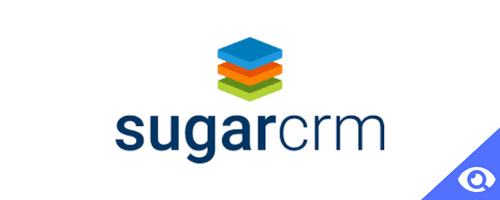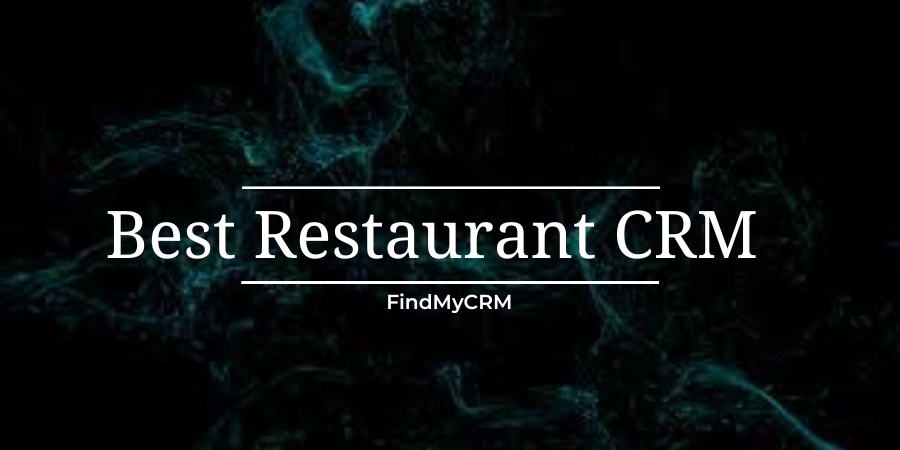What is a Restaurant CRM?
Acquiring new customers is the direct goal of any businessman, but you should remember keeping and motivating existing customers. Even if you have a well-thought-out marketing plan that includes various loyalty programs, remember that social networks, media and discount cards have a strong influence on obtaining new, potential customers.
You need to learn how to properly manage modern technologies for obtaining customer contacts. A CRM system (client relationship management) is a way to strengthen your marketing strategy, and its competent setting will help you find your target audience and establish a connection with them.
By the way, our specialists have compiled a list of top CRMs for small businesses for 2024:
[Related Article: TOP 7 Sales CRM and Reasons Why You Need One]
Do Restaurants Need CRM Software?
Knowing about your customers' tastes, purchases, needs, and even habits is a crucial factor in attracting new and retaining existing customers. A customized CRM system for a cafe is the first step to achieving this goal.
Managing your customers' preferences means you'll always be aware of what your customer likes and dislikes. Plus - you will be able to understand what your guests would like to change or improve in the work of your cafe. Also, you will always have ideas to improve your business. This useful data will help you make your cafe successful and adjust service processes for more profit.
Key Features of a Restaurant CRM
CRM provides in one window the work of the hall, kitchen, product accounting, costing, personnel management, loyalty system, delivery service. As a rule, the system consists of several modules:
- Front Office or cashier module - processing orders and distributing them to tables, working with invoices, checks, sales;
- Back Office or manager module - creating menu items, working with revenue and sales reports, discount programs, managing users, access rights;
- Product Office or warehouse module - recipe creation, cost calculation, monitoring of cooking time.
- Cook's module — displays the composition of the KDS check;
- Booking module - allows you to quickly manage your online booking, distribute guests to free tables - this helps to improve turnover by 15-20%;
- Delivery module - suitable for establishments that have their own couriers, can distribute tasks among trips, shows the delivery time.
Each CRM offers additional options and "chips". These competitive advantages can be considered when choosing a system based on business needs and budget. Examples of such additional functions:
- customizable prompts at the checkout and in the application for employees: reminders about the order, about the readiness of the dish, about the fact that the products in the warehouse are running out;
- contactless electronic menu by QR code, which is updated in real time and works on any device;
- the ability to work offline, saving data if a failure occurs and the Internet is turned off for some time in the hall;
- easy integration with third-party services thanks to the API;
- templates for building free websites and landing pages for delivery.
[Related Article: Top 12 CRM Functionalities and Features List]
How a CRM Helps You Engage and Retain Customers
But there is a minimum necessary functionality that must be implemented in the software for cafes and restaurants:
- automatic order management, which will allow the client to get what he wants in the shortest possible time;
- Online payment tools, as well as a developed cash payment mechanism;
- drawing up a check, as well as providing bonuses, discounts and implementing a loyalty program, which automatically recalculates the cost of the order;
- generation of orders and invoices in automatic mode and data output for printing;
- tools for creating answers to the work of the institution, including the preparation of financial statements;
- a tool for monitoring the arrival of goods for the operation of the institution, purchasing products and accounting for other data;
- creation of employee work quality assessment reports, work control tools, such as schedules, drawing up salary slips, distribution of vacations.
The functionality of the CRM system for restaurants can be almost any. That's why we evaluate opportunities, needs and make the optimal solution. We select the technology stack and make a product that will bring real benefits to the business.
Top 6 Restaurant CRM Systems
Lavu POS

Lavu combined years of restaurant experience with modern technology to create a point of sale system that makes sense. An intuitive interface allows you to complete daily tasks and interaction with the client in the minimum possible number of steps. Lavu is the creator of the Lavu POS software application, a full featured POS system for restaurants.
Toast

Toast POS First launched in 2012. Offering sensational support to restaurant and business owners in the form of everything from credit card processing to loyalty program tools, the service quickly garnered attention.
Basically, you use Toast as your payment portal, with access to things like a card reader, a restaurant manager, and table orders. Moreover, the entire service runs on the Android system, which makes it even more versatile.
This all-in-one POS restaurant will help you streamline and improve your operations, increase profits, and keep track of menu items.
Posist
-3.png?width=500&height=200&name=Posist%20(2)-3.png)
Teams are given end-to-end control, security, and visibility of their operations from the front to the back of the house thanks to Posist's cloud-based platform.
Because this solution is specially built, we can manage market changes and make sure operators reach scale.
The APIs were created by programmers to facilitate seamless connections and data flow in your backend. Restaurants can quickly integrate any third-party technology with POS systems, reducing the time required for setup by half.
OpenTable

OpenTable is a table reservation service for restaurants. The service has been operating since 1998 and during this time managed to grow to 30,000 restaurants, $ 200 million in revenue and be sold to Booking.
The essence of the service is utterly simple: you go to the site / application, choose a restaurant nearby, depending on your preferences, and book a table for a specific time.
A user-friendly interface has been made for users that allows them to filter and find a suitable restaurant by many parameters: place, time, price segment, cuisine preferences and reviews.
By visiting restaurants on a reservation, users accumulate bonuses in the application, which they can then exchange for a discount or an Amazon gift card.
OpenTable is also a SaaS restaurant management platform that simplifies many processes, including booking management, CRM, many analytics reports, and email marketing.
Kapture CRM

An all-in-one customer service platform for enterprises across industries, Kapture is an Enterprise-grade SaaS-based customer support automation platform. The CX solution is adaptable to company requirements and is trained using past data, assisting companies in providing workable automated solutions to customer inquiries.
In addition to extensive interfaces with cloud telephony sources like Knowlarity, Ozonetel, Exotel, and others, Kapture strives for seamless integrations with systems like ERP, Shopify, WooCommerce, Unicommerce, Magento, and Logistics Partners.
Sugar CRM

SugarCRM is the manufacturer of one of the most popular CRM systems in the world. The company was founded in June 2004. Headquartered in Cupertino, California, United States. Sugar is a CRM software that allows you to manage sales and customer relationships in large enterprises. Sugar is the most recommended and best CRM system by users. Four-time winner of the prestigious PCMag Business Choice Awards. Market visionary according to Gartner Inc. Salesforce's direct competitor, MS Dynamics 360.
The Sugar system covers three areas of business: marketing, sales and customer service. Sugar Market costs from $1,000 for 10,000 contacts per month, Sugar Sell from $49 per user per month (depending on the version), Sugar Serve from $80 per user per month. For details and individual prices, contact an eVolpe Consulting Group representative.
How to Choose the Best CRM System for Your Restaurant
It is not so easy to choose a CRM system that suits your needs. For the final decision, it is best to analyze the processes step by step - this way it will be easier to choose a program and not make a mistake. So, where to start choosing a CRM for a cafe:
- Determine what tasks the CRM system should perform in your cafe. For example, a standard set of actions: maintaining a customer base, setting up alerts for visitors, and setting up loyalty programs.
- Find solutions for your tasks. The technical support of the program you choose will help with this. It is best if the program has a test period - so you can visually see everything and test the system in your cafe.
- Learn about the integration of the CRM system with other applications. For example, programs for analytics, newsletters, various loyalty programs and IP telephony.
[Related Article: CRM System: Complete CRM Buying Guide for Beginners]
The Takeaway
When choosing a CRM for a restaurant, cafe, or bar, it is crucial to consider several important factors that will greatly impact the success of your business. First and foremost, you need to understand the format of your establishment and the specific requirements it entails. Whether you run a fine dining restaurant, a cozy cafe, or a bustling bar, the CRM system should align with the unique needs of your establishment.
Size is another crucial factor to consider. The CRM system should be scalable and flexible enough to accommodate your business growth. Whether you are a small local eatery or a large chain of restaurants, the CRM system should be able to handle the demands of your operations without any hiccups.
Of course, budget plays a significant role in the decision-making process. It is important to find a CRM system that offers the right balance between affordability and functionality. While it may be tempting to opt for a low-cost solution, it is essential to ensure that the system meets your business requirements and provides value for money.
The functionality of the CRM system is a key consideration. It should offer a comprehensive range of features that streamline business processes and enhance efficiency. From customer relationship management to order management, loyalty programs, and analytics, the CRM system should cover all aspects of your restaurant operations.
Technical support is another critical factor to consider. A reliable and responsive support team can make a significant difference in resolving any issues or concerns that may arise during the implementation and usage of the CRM system. Look for a provider that offers prompt and knowledgeable support to ensure smooth operations.
In today's digital age, the availability of remote work is becoming increasingly important. The CRM system should provide the flexibility for your employees to access and manage data remotely, allowing them to work efficiently from anywhere. This feature is particularly crucial during unforeseen circumstances, such as a pandemic or natural disasters, where remote work becomes a necessity.
By carefully considering these important factors, you can select the best CRM system for your restaurant, cafe, or bar that will empower your business to thrive and succeed in the competitive hospitality industry.





